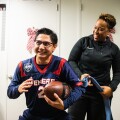Jennifer King, the Washington Commanders’ assistant running backs coach, is the NFL’s first African American woman to serve as an assistant position coach. She played women’s tackle football and coached at the college and professional levels before coming to the team two years ago. Here are excerpts from Special Olympics Virginia’s interview with her.
Special Olympics Virginia: What are the most important skills for a running back to have?
Jennifer King: The most important skills for a running back to me are athleticism, vision and toughness.
SOVA: What do running backs do to avoid injuries? If they do get injured, can they keep playing?
King: Running backs train very hard in the weight room and with our athletic trainers to increase strength and improve body movements to help avoid injuries. Unfortunately, football is a violent sport, and injuries can’t be avoided.
Sometimes, running backs can play through injuries, but it all depends on the severity and if they can still perform at a high level. Safety is our main concern as coaches, so we want players to be honest with us about how they are feeling. We do not want to put an injured player on the field that should not be playing.
SOVA: How do you work on passes for running backs?
King: We have a lot of drills we use to improve our running backs’ pass-catching and route-running skills. We do some things before practice and sometimes after to get extra work on those skills.
SOVA: What is the proper position for a running back to receive a handoff?
King: We like our guys to receive the handoff in a good athletic position, with bent knees and their eyes up. It is important to know the proper footwork for the particular run to receive the handoff, along with a nice open pocket for the quarterbacks to give us the ball.
SOVA: If Special Olympics athletes want to work on their running game, what would you suggest?
King: I would suggest working on agility drills, using cones or whatever you may have available. Agility and footwork are skills we work on every single day to be hard to tackle. It is even more important in flag football, because in many cases it’s easier to pull a flag than to make a tackle.
SOVA: Special Olympics is all about inclusion and diversity. Has it been easy as a woman to coach when the athletes are all men?
King: I have been fortunate to have worked with some great coaches, and my journey as a woman coaching male athletes has been smooth. They want to learn and get better. If you can provide those things, I’ve found the guys don’t care who it comes from, as long as they are being challenged and improving.


